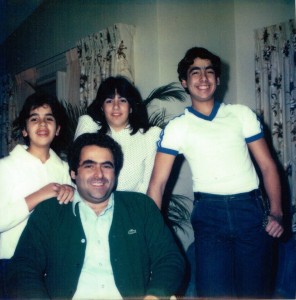I’ve been spending a lot of time with my father, who is in hospice care. One of the twisted blessings of him being near the end of his life is that he’s opening up more freely than he ever has. One such conversation goes to show that things you see as a kid don’t always match up with what’s really going on.
Mood music:
Like a lot of families, we’ve hit our financial walls over the years and a few years ago I had to ask my father for help. That was a killer, because I’ve always taken pride in making things work without having to do that. It was painfully humbling.
I’m a lot like the character Quint in “JAWS” in that I suffer from working-class hero syndrome. (One of the many excellent lines in that movie was when Hooper told Quint to knock of the working-class hero crap, after Quint kept picking on Hooper for not getting his hands dirty enough.)
In my case, I like to believe that adults should be able to make a living without any help from family and friends. In a financial rut? You figure it out and avoid asking your parents for help at all costs. I’ve looked down on people who have done that in the past. I described one case as someone using their father like a piggy bank.
To me, asking Dad for help always meant failure.
I think some of that attitude comes from the fact that I leaned on my father‘s financial assistance a lot in my 20s. When my 1981 Mercury Marquis finally died a painful death at the hands of its abusive driver, I went to Dad and nagged for a new car. I got one — a 1985 Chevy Monte Carlo.
I look back on that sort of thing and realize what a burden that was on my father. When I got married and settled into my 30s, I vowed never to bother my father for money again. I would manage on my own at all costs.
For the most part, we have. I owe most of that fact to Erin, who is far smarter about finances than I am.
So in the room at hospice, Dad and I discussed the delicate balance of paying for the kids’ private school and keeping the mortgage up to date and food on the table. He floored me with this statement:
“I know what it’s like. There were a lot of those situations when you guys were kids,” he said.
What? I always assumed that he was always on top of the family finances and that paying for things was never a problem.
But thinking back on it all, it makes perfect sense. I just think of the medical bills alone the three of us kids wracked up in the 1970s and 80s. It had to have been staggering, between my multiple hospital stays for Crohn’s Disease, Michael’s asthma treatment and Wendi’s hospitalizations for depression.
My father practically lived at his business, but I always assumed it was because he preferred to be there than at home.
I still believe that to a point. But I think a lot of it also had to do with making ends meet in a world gone mad.
Since I always assumed we were well off when I was a kid, my father clearly did a good job of shielding us from the financial ugliness.
So I thanked him.
“No problem. I love ya,” he said.
Love you too, Dad.
Below: Me with Dad, Wendi and Michael, Christmas Eve 1982.







